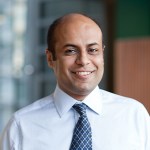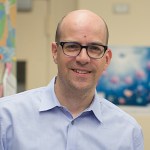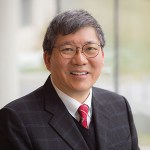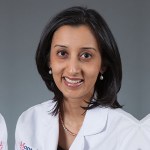In 2010, Amit Verma, M.B.B.S., and Ulrich Steidl, M.D., Ph.D., were spending hours in their Einstein labs studying cellular mechanisms linked to a group of blood cancers called myelodysplastic syndromes (MDS). This cancer of the bone marrow leaves people with too many defective blood cells and too few normal ones, leading to life-threatening anemia. “Treatments at the time could reduce levels of defective blood cells for a while, but we needed therapies that could attack the root cause of MDS,” Dr. Verma says.
A few years earlier, these researchers had been among the first to show that MDS arises from abnormalities in hematopoietic stem cells (HSCs)—cells in the bone marrow that produce all of the body’s blood cells. Dr. Steidl’s lab went on to identify novel targets against these disease-causing malignant stem cells in both MDS and a related disease, acute myeloid leukemia.

We needed therapies that could attack the root cause of MDS.
— Amit Verma, M.B.B.S.
Dr. Verma and his team were homing in on a signaling pathway in HSCs that inhibits the cells from developing into mature red blood cells. They discovered that this pathway, known as SMAD2/3, was overactive in MDS patients. “We theorized that blocking the SMAD2/3 pathway with a drug would allow blood cells to develop normally, preventing the debilitating and even deadly anemia that accompanies MDS,” says Dr. Verma, now associate director for translational research at Albert Einstein Cancer Center (AECC), professor of medicine and of developmental & molecular biology at Einstein, and director of hematologic malignancies at Montefiore.
The researchers’ hunch proved correct. Scientists across the globe soon began testing potential therapies, first in animals and then in human clinical trials. The payoff came in January 2020 when the New England Journal of Medicine published a study they participated in showing that the drug luspatercept significantly reduced the need for blood transfusions to treat anemia in MDS patients.
Three months later, the U.S. Food and Drug Administration approved the drug (brand name Reblozyl)—the first new therapy for MDS in 12 years. “It’s gratifying when you can see how the basic science eventually leads to life-changing treatments,” Dr. Verma says. “That’s the driver for everything we do.”
“Nearly all therapeutic breakthroughs have a similar story—arising from ideas born in labs and then worked on for 10 to 15 years before their use in the clinic,” says Dr. Steidl, who is associate director for basic science at AECC, professor of cell biology and of medicine, and the Diane and Arthur B. Belfer Faculty Scholar in Cancer Research at Einstein, and associate chair for translational research in oncology at Montefiore. But it can be challenging, he says, to obtain research grants and government funding, “especially for ideas that are outside of the mainstream.”

We would like to bring innovative therapies to patients at a rapid pace … actual fundamental advances.
— Ulrich Steidl, M.D., Ph.D.
To speed the development of new therapies, Drs. Verma and Steidl are helping to launch the first-of-its-kind Blood Cancer Institute within AECC, of which they will be the co-directors. “We would like to bring innovative therapies to patients at a rapid pace,” Dr. Steidl says. “And by that, I don’t mean variations on tried-and-true treatments but actual fundamental advances.”
The institute will kick-start the early stages of both basic and translational research, when outcomes are less certain, Dr. Verma says. “We will focus on areas where we can make a unique contribution to the field—basic bench research and also early-phase clinical trials with novel compounds, for instance,” he says. “Then we can take the next step and bring the state-of-the-art science into the clinic.”
Achieving that vision will require a $6 million-plus philanthropic investment. Marilyn and Stanley M. Katz, both longtime members of Einstein’s Board of Trustees and staunch supporters of AECC, believe in the vision of these researchers and in the powerful role philanthropy plays in elevating influential cancer research. “This is about hitting the home run, finding the cure,” Mr. Katz says. “But to get there, you need enough charitable gifts to get the preliminary work done, so you can land funding for larger-scale investigations.”
The AECC is ideally suited to take the lead on blood-cancer research, says Edward Chu, M.D., M.M.S., director of the AECC, professor of medicine and of molecular pharmacology, and the Carol and Roger Einiger Professor of Cancer Medicine at Einstein, and vice president for cancer medicine at Montefiore. “Our cancer center is at the forefront both in the lab and in the clinic,” he says. “The synergy between our research scientists and clinicians helps us translate lab findings into clinically applied solutions for changing the course of cancer medicine and to improve the lives of our cancer patients.”

Our cancer center is at the forefront both in the lab and in the clinic.
— AECC Director Edward Chu, M.D.
The discovery about 20 years ago that genetic mutations in HSCs could lead to cancer “changed everything when it comes to treating blood cancer,” says Aditi Shastri, M.D., assistant professor of medicine and of developmental & molecular biology at Einstein, an oncologist at Montefiore, and a member of AECC. “We realized that we could design treatments that target those mutations and spare healthy cells.”
One prime example is the targeted therapy imatinib (Gleevec) that has transformed chronic myeloid leukemia—once nearly always fatal—into a manageable disease for many patients. And CAR T-cell therapy, which involves reprogramming the immune system’s T-cells to attack cancer cells, has given new hope to patients with certain forms of leukemia and lymphoma. But further progress is vital.
“Many types of blood cancer remain hard to treat,” Dr. Shastri says. “And older people—the people most likely to develop blood cancers—are often too frail to undergo aggressive blood-cancer therapies, such as stem cell transplants.”
Philanthropic giving will support the people and projects needed to get the state-of-the-art Blood Cancer Institute off the ground. Initial funds will endow a directorship, provide seed funding for research projects, and support the recruitment of junior faculty to conduct research and mentor the next generation of scientists.

Older people—the people most likely to develop blood cancers—are often too frail to undergo aggressive blood-cancer therapies.
— Aditi Shastri, M.D.
For Marilyn Katz, who served as a trustee chairperson for the AECC from 1995 to 2020, the commitment to cancer research and the AECC’s expansive work is personal. She talks of people in her life stricken by cancer—a close friend who recently died from leukemia; her daughter-in-law, who had breast cancer; and her sister, who died of brain cancer at age 52. “My hope for the new institute is that it makes enough progress for more people to live healthy, full lives,” she says.
Dr. Verma says that he is more optimistic about realizing Mrs. Katz’s vision now than at any point in his career. “This new institute will provide resources and access to technologies, but most important, it will foster collaborations,” he says. “That’s how science advances.”